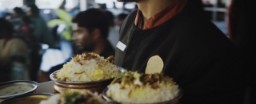Far off the beaten track, the lush Jaintia and Garo Hills in the west of Meghalaya are nothing less than elysian fields. The region is known for its gorgeous hilly terrain, spectacular waterfalls, horseshoe rock cliffs, some of Asia’s longest caves, and panoramic views.
In the midst of all this beauty, the celebrations of Behdienkhlam come to life. Centredaround the tiny town of Jowai, the festival of Behdienkhlam is celebrated in the month of July. During this festival, people gather around a holy stone and worship it for a good harvest. Locals make beautiful cane bridges to cross the streams and gather at Jowai, and bring along handicrafts, artefacts, and items used by the locals in day to day life to sell during the festival.
Tribes of Jaintia Hills are known for making cane baskets, mats, waterproof stools that act as rain shields, sleeping mats, and terracotta jewellery. They also sell beautifully designed and carved bamboo sticks that are used to make fishing traps. The atmosphere is vibrant and brimming with fun.
'Behdienkhlam' literally means 'to drive away evils (Beh-dien) and plague (khlam)’. It is observed by Hindus and followers of the 'Niamtre' faith, often the locals of the Jaintia region.
Highlights of the festival
For Behdienkhlam- rounded, polished, and tall trunks of trees are felled in the sacred forest area and left to dry in the woods for a couple of days. With great fanfare, dancing and singing, these huge trunks are then brought to the town. The festival begins with sacrificing a pig to KniaPyrthat -Thunder followed by the ringing of brass bell (Wasan) by the priests along the main road of the town.
The most striking feature of this colorful festival is the making of Raths - they are huge bamboo structures painted and decorated with colorful papers. Every village creates a rath or a chariot with its own symbols and messages. Around 30 men carry the rath to a sacred pool known as Aitnar, where they are immersed to bring good fortune.
All the villages participate in a type of soccer game with a wooden ball, known as Dad-Lawakor. The villagers compete with good spirits in this game as the winners are believed to gain extra blessings for the coming months. On the day of culmination, i.e., the fourth day, the young men of the town led by the priest visit every house of the town, climb their roofs, and beat them with a bamboo stick to chase away evil spirits.
How to reach Jowai?
About 65 km from Shillong, the capital of Meghalaya, Jowai can be reached via road. It takes about a 2-hour drive from Shillong to Jowai. The main means of transportation in Jaintia Hills is State Roadways. Jowai acts as an ideal base camp for those intending to explore Jaintia Hills.



